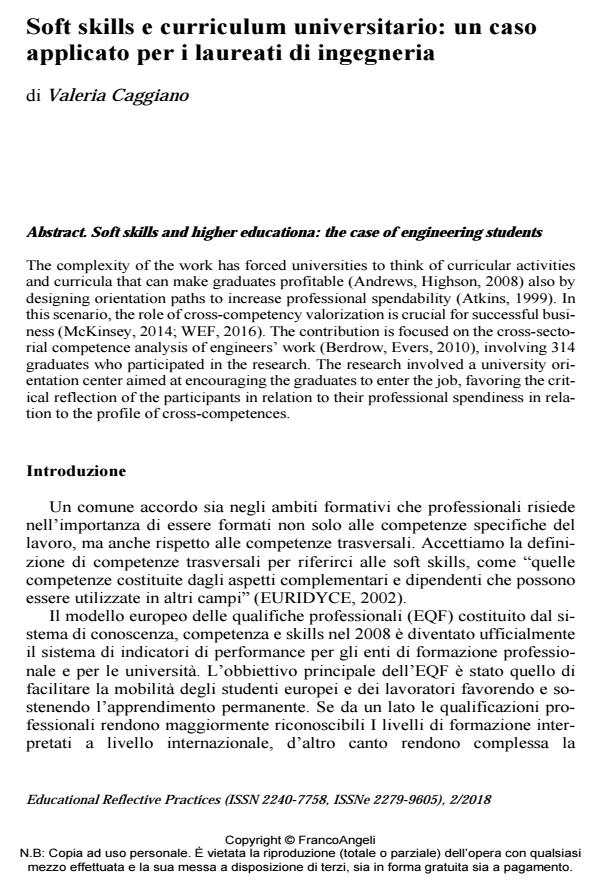Soft skills and higher educationa: the case of engineering students
Journal title EDUCATIONAL REFLECTIVE PRACTICES
Author/s Valeria Caggiano
Publishing Year 2019 Issue 2018/2
Language Italian Pages 14 P. 94-107 File size 170 KB
DOI 10.3280/ERP2018-002007
DOI is like a bar code for intellectual property: to have more infomation
click here
Below, you can see the article first page
If you want to buy this article in PDF format, you can do it, following the instructions to buy download credits

FrancoAngeli is member of Publishers International Linking Association, Inc (PILA), a not-for-profit association which run the CrossRef service enabling links to and from online scholarly content.
The complexity of the work has forced universities to think of curricular activities and curricula that can make graduates profitable (Andrews, Highson, 2008) also by designing orientation paths to increase professional spendability (Atkins, 1999). In this scenario, the role of cross-competency valorization is crucial for successful business (McKinsey, 2014; WEF, 2016). The contribution is focused on the cross-sectorial competence analysis of engineers’ work (Berdrow, Evers, 2010), involving 314 graduates who participated in the research. The research involved a university orientation center aimed at encouraging the graduates to enter the job, favoring the critical reflection of the participants in relation to their professional spendiness in relation to the profile of cross-competences.
- Andrews J. ,Highson H. (2008). Graduate Employability, ‘Soft Skills’ versus ‘Hard Business Knowledge’: A European Study. Higher Education in Europe, 33(4): 411-422.
- Atkins M. J. (1999). Oven-ready and self-basting: taking stock of employability skills. Teaching in Higher Education, 4(2): 267-280.
- Berdrow I. and Evers F.T. (2010). Bases of competence: an instrument for self and institutional assessment. Assessment & Evaluation in Higher Education, 35(4): 419-434, 1-10.
- Caggiano V. (2010). Quantità e Qualità dell’orientamento. Anicia.
- Callea A., Caggiano V., Chirumbolo A., Pedon A. (2008). Qualità e Quantità dell’orientamento: un caso applicato, Giornale italiano per l’orientamento GIPO, 2.4: 35-46.
- Centro studi CNI (2016). La condizione occupazionale dei laureati in ingegneria in Italia. Anno 2015, -- testo disponibile al sito https://www.centrostudicni.it/.
- Centro studi CNI (2017). L’inserimento occupazionale dei laureati con competenze ingegneristiche. Anno 2015, -- testo disponibile al sito https://www.centrostudicni.it/.
- Centro studi CNI (2017). Gli immatricolati ai corsi di laurea ingegneristici. Anno accademico 2015/2016, -- testo disponibile al sito https://www.centrostudicni.it/.
- Centro studi CNI (2017). L’offerta formativa in ingegneria: oltre 700 corsi disponi-bili in tutto il territorio nazionale. Anno accademico 2017-2018, testo disponibile al sito https://www.centrostudicni.it/.
- EQF (2008) http://www.accreditedqualifications.org.uk/european-qualifications-framework-eqf.html.
- ESCO (2016) https://ec.europa.eu/esco/portal/home.
- EUROPEAN PARLIAMENT COUNCIL (2008). Recommendation of the European Parliament and of the Council of 23 April 2008 on the establishment of the European Qualifications Framework for lifelong learning (23 April), Official Journal C 111.
- Fang X L, and Koh S. (2005) Transition of knowledge/skills requirement for entry-level IT professionals: An exploratory study based on recruiters’ perception. Journal of Computer Information Systems, 46: 58-70.
- Grandin J. M. (2006). Preparing Engineers for the Global Workplace: The Univer-sity of Rhode Island. The Online Journal for Global Engineering Education, 1.1.
- Grugulis I., Vincent S. (2009). Whose skill is it anyway? Soft Skills and Polarization. Work, Employment and Society, 23(4): 597-615.
- Guichard J. (2005). Life-Long Self-Construction. International Journal for Educa-tional and Vocational Guidance, 5(2): 111-124.
- Heckman J. and Kautz T. (2012). Hard Evidence on Soft Skills. Labour Economics, 19(4): 451-464.
- Holmes L. (2001). Reconsidering graduate employability: The ‘graduate identity’ approach. Quality in Higher Education, 7(2): 111-119.
- Loiodice I. (2004). Non perdere la bussola. Orientamento e formazione in età adulta. Milano: FrancoAngeli.
- Manpowergroup, Università degli Studi di Firenze (2014). Soft Skills for Talent: In-dagine ManpowerGroup sulle competenze trasversali più richieste dal mercato del lavoro. Testo disponibile al sito http://www.manpowergroup.it.
- Mourshed M., Patel J. and Suder K. (2014). Education to Employment: Getting Europe´s Youth into Work. McKinsey Centre for Government.
- Negrelli S. (2005). Le trasformazioni del lavoro: modelli e tendenze nel capitalismo globale. Bari: Laterza.
- Nganga T.K., Yunusa H.M. and Hashima N.H. (2015). Soft Skills Integration in Teaching Professional Training: Novice Teachers’ Perspectives. Procedia - Social and Behavioural Sciences, 186: 835-840.
- Oladiran M.T., Uziak J., Eisenberg J.M. and Scheffer C. (2011) Global engineering teams – a programme promoting teamwork in engineering design and manufac-turing. European Journal of Engineering Education, May, 36(2): 173-186.
- Paschen M. (1996). Das Bochumer Inventar zur berufsbezogenen Persönlichkeitsdiagnostik (BIP). Ruhr-Universität Bochum.
- Piccardo C., Benozzo A. (2010). Verso una definizione complessa di ricerca-azione. In: Kaneklin C., Piccardo C., Scaratti G. (a cura di). La ricerca-azione. Cambiare per conoscere nei contesti educativi. Raffaello Cortina Editore.
- Shaffer J.S.A. e Postletwhaite B. E. (2012). A matter of context: A meta-analytic investigation of the relative validity of contextualized of noncontextualized personality measure. Personnel Psychology, 65(3): 445-493.
- Stevenson D. and Starkweather J. (2010). PM critical competency index: IT execs prefer soft skills. International Journal of Project Management, 28: 663-671.
- Wikle T. and Fagin T. (2015). Hard and Soft Skills in Preparing GIS Professionals: Comparing Perceptions of Employers and Educators, Transactions. GIS, 19(5): 641-652.
- World Economic Forum (2016). The Future of Jobs. Employment, Skills and Workforce Strategy for the Fourth Industrial Revolution.
- XIX Indagine Almalaurea (2017). Condizione occupazionale dei Laureati Sintesi del Rapporto 2017. -- Testo disponibile al sito http://www.almalaurea.it.
Valeria Caggiano, Soft skills e curriculum universitario: un caso applicato per i laureati di ingegneria in "EDUCATIONAL REFLECTIVE PRACTICES" 2/2018, pp 94-107, DOI: 10.3280/ERP2018-002007